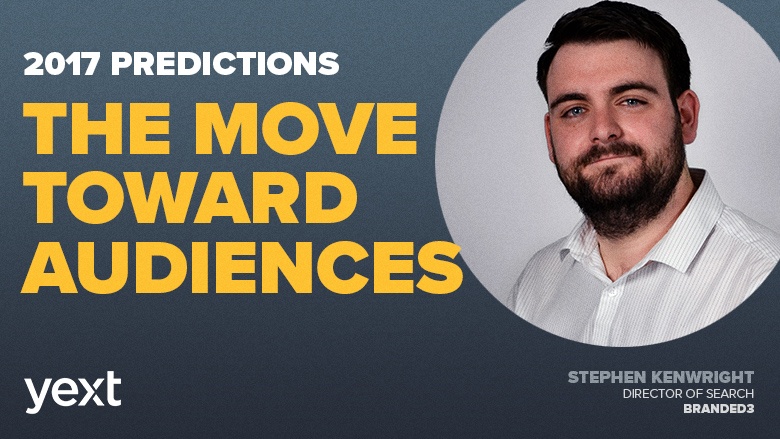Industry Insights
2017 Predictions #9: The Move Toward Audiences
To give you a jump start on the new year, we asked industry experts about their predictions for the future of location, marketing, and technology in 2017. We’ll be posting their responses over the next month here on the Yext blog. Follow us on Twitter @Yext for new posts, and tweet at us with your own predictions. […]

Yext
Dec 20, 2016

To give you a jump start on the new year, we asked industry experts about their predictions for the future of location, marketing, and technology in 2017. We'll be posting their responses over the next month here on the Yext blog. Follow us on Twitter @Yext for new posts, and tweet at us with your own predictions.
By Stephen Kenwright
Director of Search, Branded3
Google will continue to move away from keywords and towards audiences. Despite the backlash Google has experienced for obscuring search volumes, this is only going to get "worse" – and the data we're left with is not dissimilar to what other advertisers can offer.
This means a few things will probably happen in 2017:
- We can stop our educated guesses at searcher intent with paid search advertising. We'll be bidding against audiences rather than search terms, which means we can be more confident that we're serving ads to buyers and potentially increase the ROI of paid search campaigns.
- Understanding performance of SEO will become painful if organic search teams/specialists aren't talking to a brand's PPC function. We'll see a much more joined up play from agencies, but this isn't going to change the way SEO is done – just the way it's reported.
- Our best bid modifiers will become more important – spend against mobile and location is going to go through the roof. 80% of mobile ads are location-specific anyway; I can't imagine that this won't increase.
Changes like this will inevitably lead to backlash against Google, which will benefit Bing. I can see us reflecting on big growth for Microsoft's search engine this time next year. comScore are reporting that 50% of all search will be voice search by 2020, and with Cortana, Siri and Alexa all powered by Microsoft, Bing is leading the charge.
This post is part of a series of 2017 predictions from industry experts.